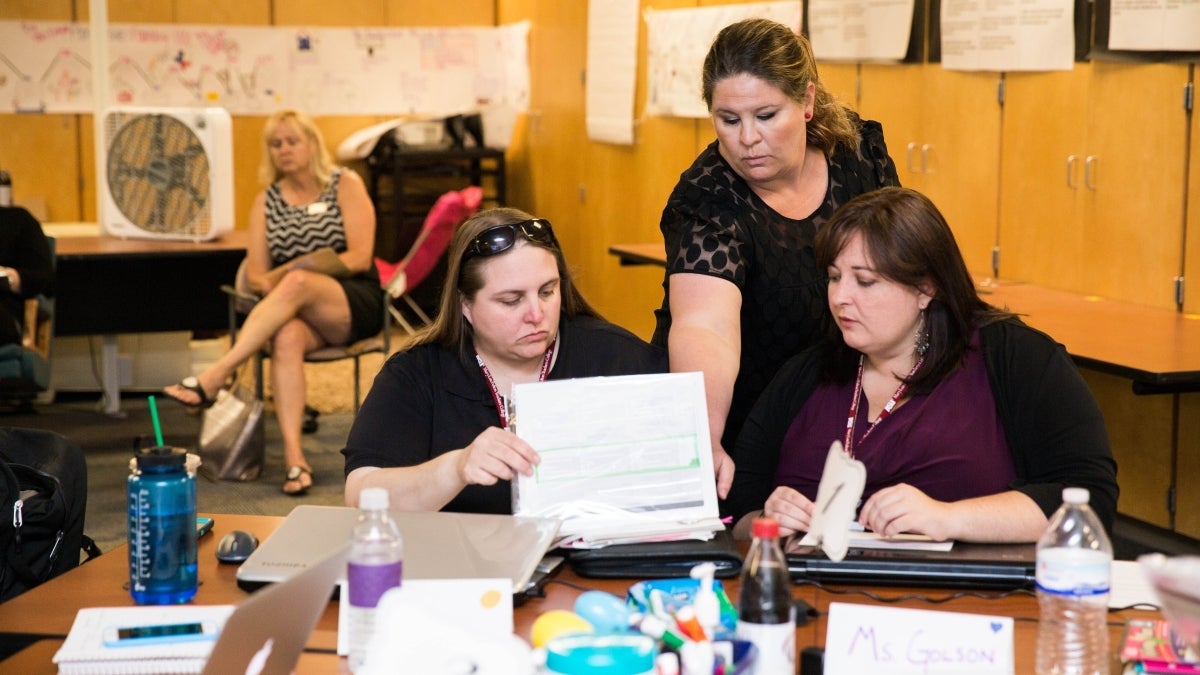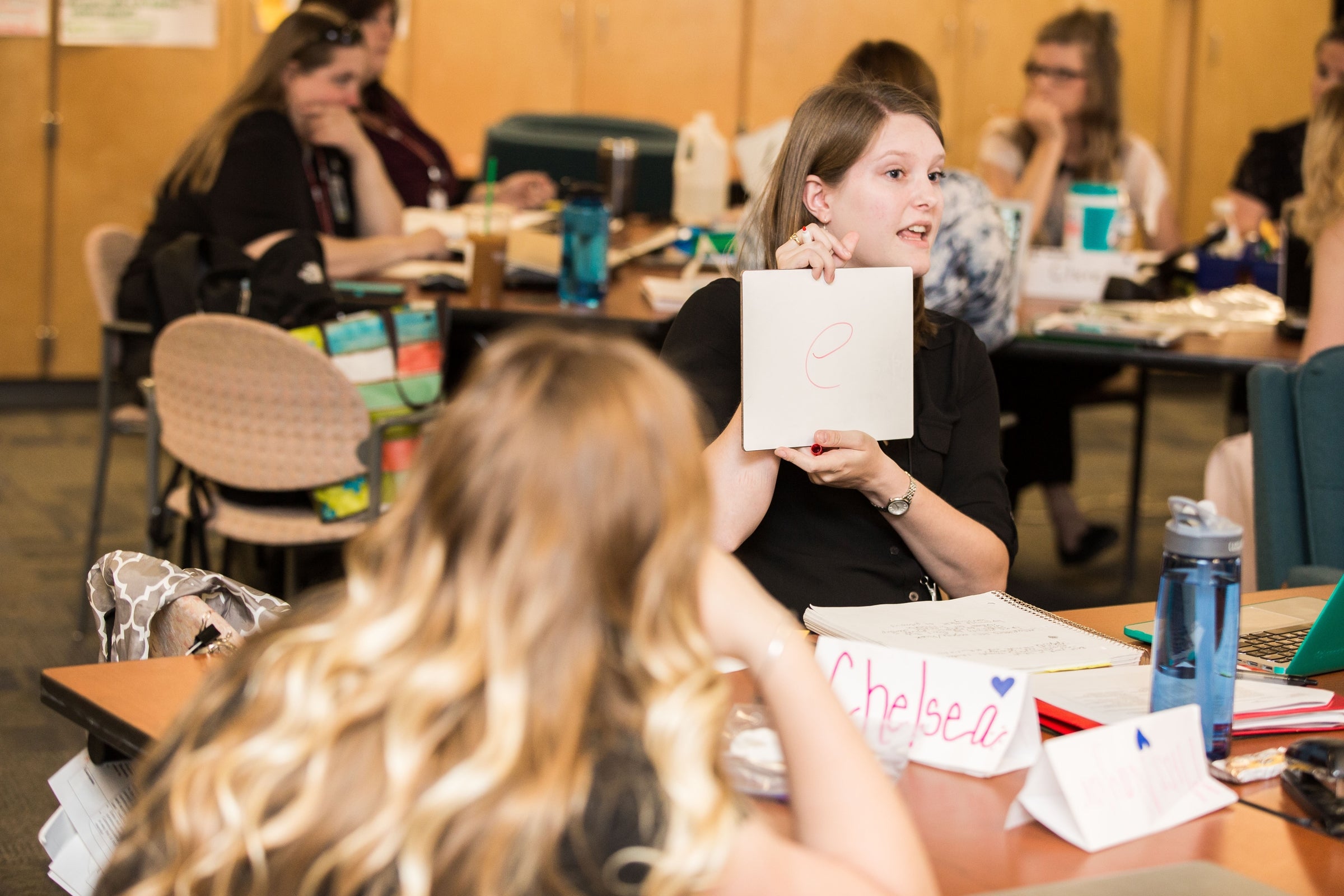Arizona State University will hit its goal of producing 200 new math and science teachers with the help of a federal grant that aids student teachers.
ASU’s Mary Lou Fulton Teachers College just awarded 53 students the Supporting Effective Educator Development — or SEED — grant, bringing the total to 204 in the third year of the program.
The SEED grants give undergraduates $10,000 and master’s students $25,000 during their iTeachAZ residency, when they spend two semesters teaching full time in a high-needs school. Thirty-eight of this month’s new grantees are undergraduates, with 15 graduate students. They can use the money for anything they want, including tuition or rent, while they are student teaching during the 2016-2017 school year.
The iTeachAZ residency is the Mary Lou Fulton Teachers College innovative preparation program in which students spend two full semesters as a co-teacher in the classroom. The students teach with a mentor teacher four days a week and then take their ASU classes one day a week at the same school they teach at.
Pam Harris, executive director of the SEED program, said that undergraduate student teachers are asked to not have outside jobs because the residency is so intense. It also is unpaid.
“The only time they could work would be the weekends, but we find that it’s too taxing,” said Harris, who also is the assistant division director for teacher preparation.
SEED grant recipients commit to working two full years after graduation as math or science teachers at a high-needs school, typically one that has a high number of students who qualify for free or reduced-price lunch.
Students who received the grant funding for the 2015-2016 school year found it invaluable. Hillary Golson (shown in the top photo at right) decided to make a career change when the health-care company she had been working for shut down.
“I knew it was the perfect time to do this, but the only way I could do it was to get some funding and there aren’t usually that many opportunities with master’s programs,” she said.
Liza Heath gives an example of how to teach letters and pronunciation in Nicole Aveni’s class at Longview Elementary School in Phoenix on April 5. Heath is an ASU master’s student who received a SEED grant. Photo by Deanna Dent/ASU Now
Golson has been a pre-service teacher at Longview Elementary School in Phoenix since last summer and will look for a job as a seventh- or eighth-grade math teacher.
“Coming from the working world, I know you have to be someone of value. My undergraduate degree was in theater and set design, and I loved it, but doing this is something that is much more marketable.”
The SEED grants also pay for training sessions for the students and their mentor teachers. In one engineering seminar, the teachers learned to make spinning tops from household items.
Another crucial component of the program is “induction” — sessions for first-year teachers to learn “soft skills,” such as how to deal with stress, being aware of emotional triggers, how to respond to students and parents in a positive way and how to live in a healthy way. That kind of training has been proposed as a way to boost retention among new teachers.
“Over time, we’ll track whether that kind of induction provided results,” Harris said. “The exit data show that they loved it.”
Increasing the number of math and science teachers is critical. A study by the Arizona Department of Education in 2014 found that 24 percent of the state’s public-school teachers will be eligible to retire by 2018, and that special education, math and science positions are the most difficult to fill.
Top photo: Nicole Aveni (standing) assists ASU students Melissa Sullivan (left) and Hillary Golson during their course at Longview Elementary School in Phoenix. Aveni is a clinical instructor for ASU and the site coordinator for the iTeachAZ program at Longview. Sullivan and Golson are master's students who received SEED grants this past year. Photo by Deanna Dent/ASU Now
More Arts, humanities and education

ASU alum's humanities background led to fulfilling job with the governor's office
As a student, Arizona State University alumna Sambo Dul was a triple major in Spanish, political science and economics. After graduating, she leveraged the skills she cultivated in college —…

ASU English professor directs new Native play 'Antíkoni'
Over the last three years, Madeline Sayet toured the United States to tell her story in the autobiographical solo-performance play “Where We Belong.” Now, the clinical associate professor in…

ASU student finds connection to his family's history in dance archives
First-year graduate student Garrett Keeto was visiting the Cross-Cultural Dance Resources Collections at Arizona State University as part of a course project when he discovered something unexpected:…

